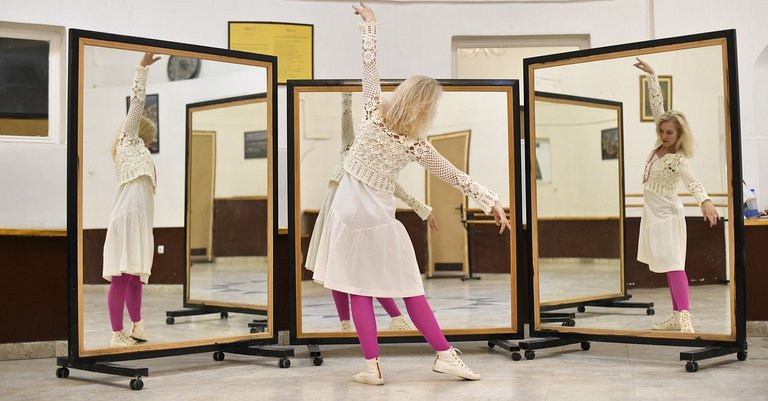

¿Qué se esconde detrás de las apariencias, de las máscaras, de ocultar nuestras falencias o nuestras fallas ante la gente, para no ser juzgados, señalados o, simplemente, para no estar vulnerables?
Nosotros seguimos investigando acerca de por qué estamos utilizando tantas máscaras y de por qué en las redes sociales estamos publicando situaciones que en realidad no son ciertas en nuestra vida cotidiana.
He llegado a la conclusión de que seguimos buscando una perfección que se está imponiendo desde fuera; una perfección que mucha gente con millones de seguidores, vidas maravillosas y estables, muestran en las redes sociales.
¿Qué tan importante es la perfección o el perfeccionismo para nosotros en la actualidad?


Cuando nos detenemos...
Lo cierto es, que tras la búsqueda de nuestro bienestar, de la lucha constante por tener una inteligencia emocional más amplia y lograr equilibrio en nuestras vidas, muchas veces no avanzamos por temor a fallar.
El que teme fallar piensa que deben salirle las cosas bien en las primeras de cambio, y comienza a darle vueltas y vueltas a las situaciones antes de tomar decisiones, lo que, no solo nos atrasa el logro del crecimiento, sino que tiene una razón de ser.
¿Se han fijado que existen personas que se toma muchas selfies antes de elegir una, o que aplaza la toma de decisiones para mañana y pasado mañana, o hasta que se piense que se ha estudiado perfectamente la situación?
Es lo que se ha denominado perfeccionismo y para los profesionales de la salud es un síntoma que forma parte de personalidades obsesivas, que son minuciosas, detallistas.
Una tendencia moderna que vemos en las redes sociales; pero:
¿Es el perfeccionismo positivo?
¿Es la perfección una meta realista?

¡El perfeccionismo no es bueno!
En el portal beinn.es de BeiNN, conseguí un artículo del 18 de septiembre del 2018 sobre el perfeccionismo; ellos dicen que la perfección no existe y que él perfeccionismo no es bueno.
Pero me llamó la atención que afirma, que investigaciones recientes demuestran que las generaciones actuales son más exigentes consigo mismas de lo que eran las generaciones anteriores.
Aunque existen logros de generaciones pasadas que no tienen nada que ver con la exigencia a ser perfeccionistas.
El asunto es que nos estamos comparando demasiado, que la perfección no tiene nada que ver con la excelencia y que nadie logra ser perfecto jamás.
Debemos buscar ser excelentes en nuestras labores y en nuestros proyectos, saber cuándo un trabajo es válido, que da beneficios y resultados, así como, que cumpla en su mayoría con los objetivos que se han perfilado antes de realizarlo.
Esto es razón suficiente para hablar de excelencia y de un trabajo bien hecho.
Buscar la perfección es un trabajo agotador, pero, buscar la excelencia, nos invita a tener mejores logros.
Ser excelente implica que debemos confiar en nosotros mismos, planificar nuestro trabajo, tomando en cuenta el tiempo y las herramientas invertidas, analizar los objetivos y afrontar nuestros miedos, siempre con una actitud positiva que nos permita aprender de los errores o de las fallas.

¿Cómo diagnosticar que estamos siendo perfeccionistas y no buscadores de la excelencia?
Manuel Yescas, en linkedin.com, ha publicado un artículo del 6 de noviembre de 2023, llamado: La perfección no existe, el perfeccionismo sí; y en este caso, el autor apunta a que el perfeccionista pierde demasiado tiempo para desarrollar sus proyectos.
Debemos aceptar nuestras condiciones para mejorarlas, o en otras palabras, buscar la excelencia.
Para esto, debemos investigar en nosotros, si tenemos contaminación de las redes sociales o de los otros, y si nos hemos convertido en unos perfeccionistas antes que medir nuestra eficiencia.
Veamos; un perfeccionista dice que no es un buen momento para realizar las cosas, que no se siente preparado y siempre critica la calidad de los proyectos que comienza, teniendo que reiniciarlos.
Piensa que hay que estudiar la situación en forma excesiva antes de actuar, consulta a muchos especialistas, y siempre critica al equipo, pensando que puede haber uno mejor y más especializado.
Es el tipo de persona para los que los líderes siempre tienen un defecto.

¿Cómo actuar entonces?
Hemos dicho que la búsqueda de la excelencia para llevar nuestros esfuerzos a que tengan un resultado óptimo o los más óptimos posibles, debería ser una gran finalidad de vida.
Al envolvernos de máscaras, excusas, o evitamos la realización de las acciones porque creemos que no van a ser perfectas, estamos incurriendo en el error de no finalizar nuestras metas y detener nuestro crecimiento.
Valorar nuestros caminos y analizar nuestros errores conlleva entender que la perfección jamás va a terminar de lograrse, pero que todo es mejorable y que es una pérdida de tiempo exceder nuestros pensamientos en críticas y detener nuestras acciones.
Profesionales opinan que el perfeccionismo es una forma de control que puede excederse y llevar a la aparición de síntomas neuróticos muy peligrosos, como la obsesión-compulsión.
En una comunidad de #Hive como @Holos-Lotus, siempre vamos a estar en la búsqueda del crecimiento, jamás de la perfección.
Buscando el aprendizaje con nuestras experiencias y de mejorar lo aprendido a través del error.
Esta variable que hoy estudiamos, el perfeccionismo, debe servirnos para evaluar hasta donde estamos siendo la causa por la cual nuestro crecimiento pueda estancarse en alguna área; así que, dejemos la perfección para el arte y vamos a liberarnos de este peso.


Excellence, not Perfectionism! -The art of knowing how to advance at one's own pace- Reflections on Mondays


What is hidden behind the appearances, behind the masks, behind hiding our faults or our failures in front of people, so as not to be judged, pointed out or simply not to be vulnerable?
We continue to investigate why we are using so many masks and why we are posting on social networks situations that are not really true in our daily lives.
I have come to the conclusion that we keep looking for a perfection that is being imposed from outside; a perfection that many people with millions of followers, wonderful and stable lives, show on social networks.
How important is perfection or perfectionism for us today?


When we stop...
The truth is that after the search for our well-being, the constant struggle to have a broader emotional intelligence and achieve balance in our lives, we often do not move forward for fear of failure.
Those who fear to fail think that things must go well at the first change, and begin to turn situations upside down before making decisions, which not only delays the achievement of growth, but has a reason to be.
Have you noticed that there are people who take many selfies before choosing one, or who postpone making decisions for tomorrow and the day after tomorrow, or until they think they have studied the situation perfectly?
This is what has been called perfectionism and for health professionals it is a symptom that is part of obsessive personalities, who are meticulous, detail-oriented.
A modern trend that we see in social networks; but is perfectionism positive?
Is perfectionism positive?
Is perfection a realistic goal?

Perfectionism is not good!
In the portal beinn.es of BeiNNN, I got an article of September 18, 2018 about perfectionism; they say that perfection does not exist and that perfectionism is not good.
But it caught my attention that it states, that recent research shows that current generations are more demanding of themselves than previous generations were.
Although there are achievements of past generations that have nothing to do with the demand to be perfectionists.
The point is that we are comparing ourselves too much, that perfection has nothing to do with excellence and that no one can ever be perfect.
We must seek to be excellent in our work and in our projects, to know when a job is valid, that it gives benefits and results, as well as, that it fulfills most of the objectives that have been outlined before doing it.
This is reason enough to speak of excellence and a job well done.
Searching for perfection is an exhausting job, but, searching for excellence, invites us to have better achievements.
Being excellent implies that we must trust ourselves, plan our work, taking into account the time and tools invested, analyze the objectives and face our fears, always with a positive attitude that allows us to learn from mistakes or failures.

How can we diagnose that we are perfectionists and not seekers of excellence?
Manuel Yescas, on linkedin.com, has published an article dated November 6, 2023, called: Perfection does not exist, perfectionism does; and in this case, the author points out that the perfectionist loses too much time to develop his projects.
We must accept our conditions in order to improve them, or in other words, seek excellence.
For this, we must investigate in ourselves, if we have contamination from social networks or from others, and if we have become perfectionists before measuring our efficiency.
Let's see; a perfectionist says that it is not a good time to do things, that he does not feel prepared and always criticizes the quality of the projects he starts, having to restart them.
He thinks that it is necessary to study the situation excessively before acting, consults many specialists, and always criticizes the team, thinking that there could be a better and more specialized one.
This is the type of person for whom leaders always have a flaw.

How to act then?
We have said that the pursuit of excellence to bring our efforts to have an optimal result or the most optimal possible, should be a great purpose of life.
When we wrap ourselves in masks, excuses, or avoid carrying out actions because we believe that they will not be perfect, we are making the mistake of not completing our goals and stopping our growth.
Valuing our paths and analyzing our mistakes entails understanding that perfection will never be achieved, but that everything can be improved and that it is a waste of time to exceed our thoughts in criticisms and stop our actions.
Professionals believe that perfectionism is a form of control that can be overdone and lead to the appearance of very dangerous neurotic symptoms, such as obsession-compulsion.
In a #Hive community like @Holos-Lotus, we will always be in search of growth, never perfection.
Seeking to learn from our experiences and to improve what we have learned through mistakes.
This variable that we are studying today, perfectionism, should help us to evaluate to what extent we are being the cause of our growth stagnating in some area; so, let's leave perfection for art and let's free ourselves from this weight.

Emilio Ríos – Venezuela
@emiliorios


- Barras separadoras y logo de English, creadas y editadas en Paint.
Separator bars and English logo, created and edited in Paint.
Cintillo personalizado de @emiliorios con el logo de #Hive, realizado por la excelente creadora @mosa71
Custom @emiliorios banner with the #Hive logo, made by the excellent content creator @mosa71Imagen de agradecimiento, tomando el logo de nuestra comunidad y editada en Paint, de:
Thank you image, taking our community logo and edited in Paint, by:
Pixabay-AdinaVoicu
Logo de la comunidad utilizado en las imágenes, de:
Community logo used in the images, from:
Pixabay-2405360Si lo deseas, puedes seguirnos en:
If you wish, you can follow us at:








